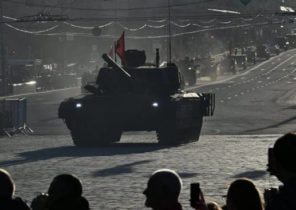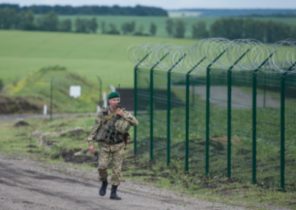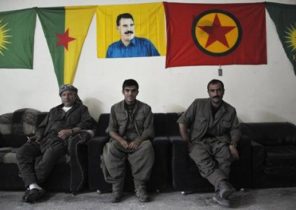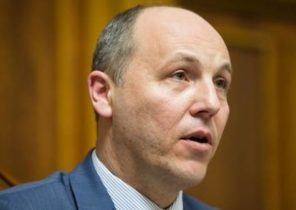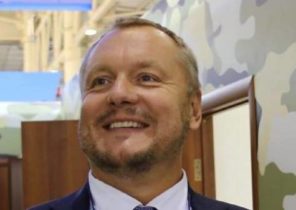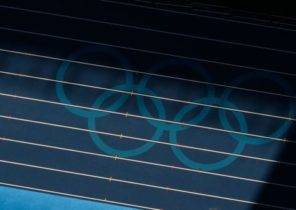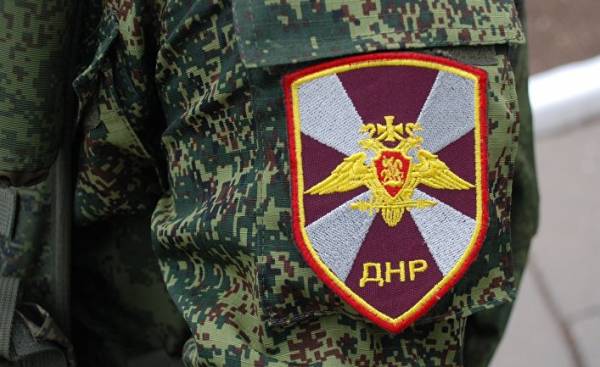
An Italian journalist once asked me why I love my country and generally consider themselves Ukrainian because I was born in the Donbass, and in everyday life speak mainly in Russian. But the fact that I was born there, where the war is now, and what I speak Russian, does not exclude the fact that I am a citizen of his country and treat her with respect, love and healthy criticism.
Another question I recently asked at the reception Desk in the hospital when I came to get a health card. An ordinary employee of the hospital (not the doctor) asked the region of my registration, and when I said, “Luhanska oblast”, the answer was: “aren’t you a separatist?” This question catches any. On it could be a joke, if this formulation would not stand the war and people living in the region, among which and your loved ones.
The power of stereotype
Labeling often occurs at this household level, among the General population in everyday life. Ordinary people take their lead from politicians, and politicians never once not said publicly: “we are All citizens of one country and we all need this country. So anyone who has a Ukrainian passport, is worthy of attention and care on the part of the state, in whatever part of the planet he was on.”
In everyday life the issues of language, residence, etc. do not seem so important. In a situation of internal and external peace, many things seem self-evident, like the fact that the road needs to go on a green light that the cars go on the right side that when you stole the purse, you need to go to the police. This category also includes the understanding that as you take care that your country is better and more comfortable, and the country cares about you.
The state mechanism relies on a functioning community, professional associations, interest groups, or the like. The debate within these groups and between them allow all of society to remain healthy and able to critically assess the situation, make decisions and defend interests. The comfort of the communities and their active position guarantees and equal society, endowed with inner strength and confidence in their own rights and responsibilities.
Solidarity around the totem
Before the war in Donetsk there was a small local community, both formal and informal — theatre-lovers, artists, left-wing and right-wing activists, technical and humanitarian intelligentsia, etc. Within these communities, as there is a division. But the more developed military developments in the region, beginning in 2013, the more these communities are fragmented, the more scattered into smaller parts.
And yet, solidarity is also present in this story. And it is worth remembering though that the community again began to work and seek possible solutions to protect their own interests.
November 21, 2013, when Kiev took to the streets, students, programmers and journalists in Donetsk at the monument to Taras Shevchenko was released five people — all members of different communities, but within their local groups, they were the only one who decided to take this step and came out in support of Euromaidan. One of the first who went out were Eugene Nasadyuk, playwright and Director, who works under the name of Peter Romanovsky. Over the next weeks and months the action, which came five, gradually expanded, they became ten, then fifty, but active players were left near the monument to Ukrainian poet all day every day for several months.
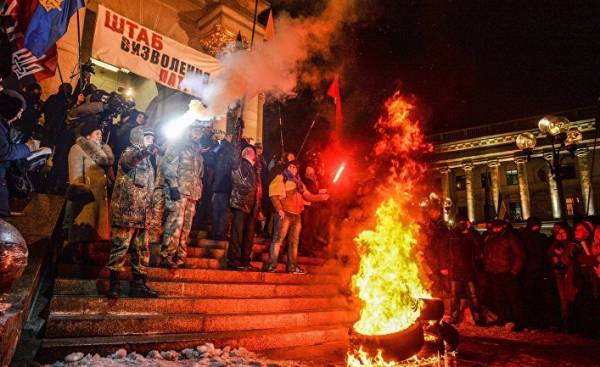 © RIA Novosti, Alexey Vovk | go to fotoannunci the action dedicated to the anniversary of the events on the Maidan
© RIA Novosti, Alexey Vovk | go to fotoannunci the action dedicated to the anniversary of the events on the Maidan
Action was impossible in January 2014, when frequent attacks on activists when violence became bigger, it got out of control. The participants of the action attacked with impunity teenagers with bats — despite the fact that the police in the city was still functioning, and the question of its reorganization did not occur. One of the methods of intimidation was the pouring of green paint, the peak of the popularity which came in 2010 during meetings in Russia and
Ukraine.
Several months passed and the people who called themselves the “Donetsk people”, to protest against alleged values of Euromaidan. In the strange logic of this protest in some way arose the problem of protecting the Russian-speaking population and human rights, which is also tied to the language. This action in video is called “anti-Maidan” as something opposed to the Kiev rally.
All five activists who came to the rally in Donetsk in November, spoke Russian. They until recently were residents of this region, and now have become displaced. They went out for their rights of citizens, opposed to corruption in all institutions of government and society, for the modernization and improvement of the educational system. These values are universal, and this “universal” meaning no breaks and exceptions on a regional or some other principle.
The largest rally, which was called by activists and the press as “Pro-Ukrainian”, took place in April 2014. It was those “five and fifty activists” that came out before the monument to Shevchenko. The photo with this action — with a Ukrainian flag in Lenin square is spread around the world.
And yet, would not be quite correct to call this a Pro-Ukrainian rally: the most important motivation was not a Ukrainian national idea (although those at the meeting also attended), and resistance to natural violence that started to grow and capture not only the streets, but also institutions of Donetsk, and thus to displace residents. It is the opposition to violence was an important factor in the adoption of humanistic ideals and democratic principles. All this helped to revive for some time the power of the local community, its significance and the belief that the team will be able to defend your city. Latest Pro-Ukrainian rally in Donetsk.
Although this protest was mostly Russian-speaking, and its chief symbol was the Ukrainian flag. The choice of this symbol was not accidental. The flag of Ukraine expressed the hope on keeping the state as a force capable of defending the country from external threats (many were afraid that the Crimean scenario can be repeated in the Eastern region). Against the backdrop of inaction of local elites and authorities, the flag became something more than a banner of two identical pieces of fabric — blue and yellow, it is a totem symbol, able to protect society from violence. It can also be seen as a cry for help as Kiev and the international community.
But what happened with this society and communities after the final triumph of violence in the region?
“Alien” from the Donbass
After three years of war the society has changed a lot. Now no one remembers the story of the five who came to a rally at the monument to Ukrainian poet in November 2013. Left on the action in April 2014 have been internally displaced persons, they dispersed to different cities. For many, this move was a cause of stress, problems in new places (housing, work, financial status, etc.) led to sense of a deep pit; at the same time, for someone new circumstances serves as a positive change and led to career advancement (many active young people went to study in European universities or got jobs in good companies).
The theme of internally displaced persons has become one of the hottest in the Ukrainian and Western media. In the beginning of the conflict, the settlers were faced with constant discrimination. In connection with the war increased the influence of stereotypes. Despite the fact that in many media and in the public space there was a lot of material on tolerance, internally displaced persons from the Donbass in the mass consciousness seemed to negatively — the poor, the uneducated, politically naive, etc. such a claim is met and when I said, “You’re the exception, but there are others, the majority, because in the end it is your region chose Yanukovych, and now we all suffer”.
In addition, those who stayed in Donetsk, too, often felt the hostility of the inhabitants of other regions of the country: you there, then earned time is not left.
In the midst of the spring events of 2014, I called the employee of the Donetsk metallurgical plant, which once did a small documentary, and she asked me: “What happened in Kiev they say about us, What do you say?” And you said, of course, different. On the one hand, the Maidan was the creation of many volunteer organizations (e.g. Vostoka, Donbass, New Mariupol and others) who have worked directly with people, helping them with products, material or even a rebuilt home of their own. On the other hand, the other part of society there was a misunderstanding, stereotype: people remaining in the occupied territories, not leave because they supposedly support the regime.
Historian Yelena Styazhkina said many times that people in the occupied territories should not be called neither separatists nor podtachivaniya mode. On the contrary, according to Styazhkina, they should be considered hostage — then logic will change the perception of what is happening.
In 2013, long before the military actions, the Ukrainian artist from Kharkov Sergey Bratkov created a work “to Go to forget”, which at that time had no relationship to military issues. Visually, the work is very simple: black and white photograph shows from behind a man riding the subway escalator down.
On pictures placed neon sign: “heathzenith”. The work was created by Bredovym as a reaction to the relationship of man and society, his desire to leave the city, to be placed in a different social context. Today, the installation is perceived quite differently: if in the first variant interpretations of the man made the decision about the departure by means of soft power, today a resident of the occupied territories physically expelled from their midst.
To leave and forget everything that was demanded from the inhabitants of Donbass of the Ukrainian society in 2014. But in some situations you can neither leave nor forget. I personally asked a lot of questions about why my parents eventually leave the region and not move to a peaceful land, does this mean that they are satisfied. For myself, I formed a paraphrase on Bratkov — “Stay and Survive”.
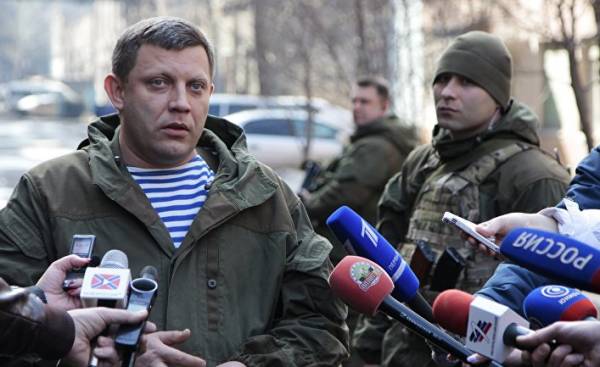 © RIA Novosti, Sergey Averin | go to fotobanka Donetsk national Republic Alexander Zakharchenko during a visit to the Yuzovsky metallurgical plant in Donetsk
© RIA Novosti, Sergey Averin | go to fotobanka Donetsk national Republic Alexander Zakharchenko during a visit to the Yuzovsky metallurgical plant in Donetsk
Styazhkina said: “People in the Donbass call themselves peaceful. That’s not a confession of a peaceful future, but the negation of war. They do not call themselves Republicans or Drowzee. This is a good step forward, it’s worth to fix. This way the future can go.”
The formation of a negative image of the region, is because of him, his character, life, about the people who inhabit it, no one outside of the region barely knew. About Donbass remembered only that it was “the pot and the all-Union construction”, for the construction and restoration of which people came with different backgrounds (including criminal) from different regions of the USSR. The myth of the dysfunctional region was fuelled by more and criminal showdowns in the early 1990-ies, as well as the origins of the political elite of Donbass — the majority of them (for example, Rinat Akhmetov, Victor Yanukovych) had a criminal past. The region was fixed and that he remained conservative, nostalgic for the Soviet past.
The development of this myth and the juxtaposition of the Donbas throughout Ukraine was profitable for the political elites who used their influence in order to get valuable the interest in the election and energize the electorate. Due to the fact that real reforms have not taken a populist methods would have to reorient the audience in the emotional plane in which the issues of language and of residence was dummy marker of backwardness of society, the tug of reforms, and the responsibility of politicians were shot and found amorphous issues. The “Soviet” alleged Donbass is a huge gap between the very rich and very poor, no education reform, absence of existing trade unions, lack of investment in health sector, low salaries, poor transport system and infrastructure, an active community — all these things unite all 24 regions of Ukraine and Crimea. The realization that the problem of modern Ukrainian society is not in the Eastern region, and consists in the substitution reform populism will lead to the fact that everyone will feel like a resident of Donbass — a powerless minority, not able to fend for themselves.
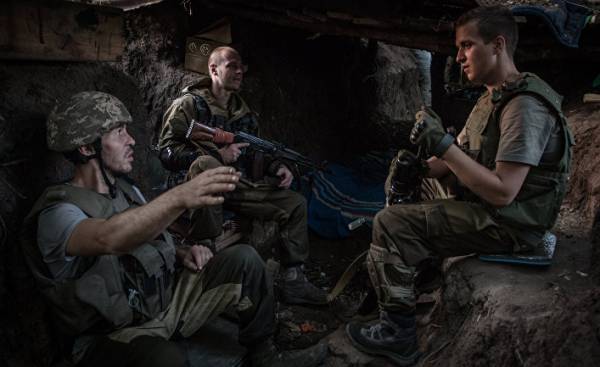 © RIA Novosti, John trust | go to fotobabble militia in the location of the brigade at the village of Marinka in the Donetsk region
© RIA Novosti, John trust | go to fotobabble militia in the location of the brigade at the village of Marinka in the Donetsk region
Fear of the realization that society is not protected by the state becomes a reason to create a mythical Other, a kind Stranger, who came this time not from abstract space, and from the particular Donbass, which in turn originate all the troubles.
Flock mates
In the spring of 2014 before the announcement of the ATO in Donetsk was an attempt to create a Committee of Patriotic forces of Donbass — public initiative that would defend the interests of the residents of Donetsk and Lugansk region at all levels. Despite the fact that the Committee, which included the Donetsk intellectuals and civil society activists, today there is still, issues of the region and mostly solved without their participation.
Against the backdrop of war, the settlers were able to form a model of the current community, which is able to defend its interests — and the interests of Donetsk and Lugansk region — self. But this, by and large, did not happen. The already fragile community was divided into small groups, who began to defend their interests within their small community, isolating each other and increasing competition within their own groups. This struggle and competition is often accompanied by figuring out who among the activists is a great patriot who is a great activist who suffered more and who less, who advocated for human rights.
For example, in my recent conversation with Eugene Nacajuca, he dropped a phrase that he would not want to associate themselves with some of the current members of the Donetsk region, and any rallies and meetings organized by them, cause distrust.
A similar opinion was expressed by other activists and immigrants. Similar feelings to some degree and I feel. Perhaps such a position is called with nepereinami injury, it is possible that there is an internal secret (forced) competition “for a place under the sun.” Those who refuse to participate in this struggle out of the circle of community and becomes a loner, or is adjacent to another group.
The American sociologist Richard Sennett in his book “the Myth of Purified Community, the Uses of Disorder: Personal Identity and City Style” (1996) says that “for the mythical solidarity in communities characterized by the fact that people avoid to acknowledge the differences between themselves and others… a Sense of “we” is a way to avoid having to look deeper to each other.” Ukrainian society is like this model: it is the concept of “we” are not shaped by the adoption of different categories and groups, and often even eliminates them.
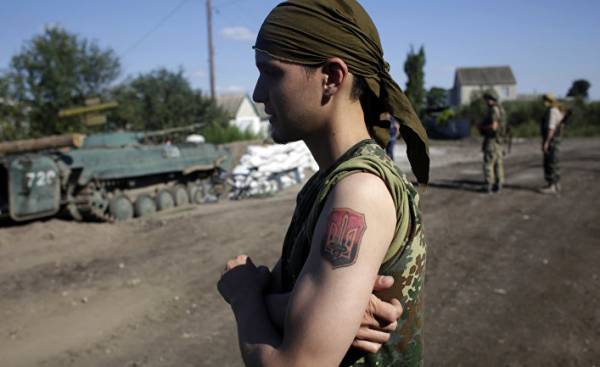 © AFP 2016, Anatolii StepanovУкраинский soldiers in the positions near the city of Lugansk
© AFP 2016, Anatolii StepanovУкраинский soldiers in the positions near the city of Lugansk
Segmented society has ceased to communicate with each other, identify common goals, to see each other as allies, not the enemy. Any communication reduced to “kitchen conversations,” Facebook-activism or posts in other social networks. Street protest is not working because has been compromised not once paid shares. At the same time, a representative group that leads the debate, often reduced to a small circle of people with similar views and background. To go beyond means to go out of your comfort zone, to associate myself with those who had not crossed, and look at problems holistically, not focusing on their personal interests. It all still seems utopian and problematic.
Now the war justifies everything — the goal means, of a fictitious solidarity, insecurity and excessive demonstration of patriotism, etc. All this, of course, plays into the hands of political forces that will try to hold their seats at the next election and return to their promises to the electorate, not the society.
Unfortunately, it is impossible even to assume that some of the top political elite will interrupt the broadcasting of TV channels (as, for example, did President Poroshenko when he announced the introduction of the EU visa-free regime for Ukrainians) emergency message which will proclaim the course on the humanization of society, or, say, will give any other example that focuses on the tolerant attitude to the residents of the two Eastern regions. Or let’s say, the Parliament will begin to address the real lobbyists of the region, intellectuals, writers and philosophers.
I’d still like to believe that when you stop to shoot the gun, we will be ready to accept the world and people of all without exception. After all, we in any case have to do it.

